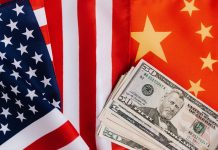Hsiao-Hung Pai reports on the unprecedented occupation of the Taiwanese parliament.

For the first time in Taiwan’s history, students have occupied the parliament. Hundreds have taken over the building, blocking the entrance with sofas and chairs. Outside the parliament, university lecturers and professors have come out in their support. A nationwide student strike is unfolding.
The occupation is in response to a free trade agreement signed in June 2013 between KMT, the ruling party in Taiwan, and the Chinese Communist Party (CCP), as a follow-up to the Economic Co-operation Framework Agreement signed in 2010 to open up both markets.
The deal was due to be ratified by legislators. Students argue that the trade deal will damage the economy and make life harder for working-class people. Taiwan’s trade unions support the student occupation, saying the government has never consulted workers’ organisations in reaching such this agreement that will have a negative impact on workers’ lives. Wages, particular those in service industries, where 60% of workers in Taiwan are employed, have been on the decreased by 5.86% in the past decade, according to the Taoyuan Federation of Trade Unions. Under the trade agreement, China’s larger service businesses can enter and compete with the smaller service businesses in Taiwan, no doubt leading to lower wages and worse of conditions in the fierce competition between capital.
The Federation of Trade Unions says: “This happened sixteen years ago, when the government opened the island to free trade, advocating outflow of industries and promoting “westward movement” of capital (to China) and “southward movement” of capital (to Southeast Asia), leaving waves of Taiwan’s workers laid off without redundancy and pension. This will happen again with the trade agreement today.” Union members are distributing water and food supplies to students right now.
Prior to, and since the agreement was signed, there have been numerous debates among citizens about the terms of the deal. But the public debate has not been considered by the decision-makers and the KMT ignored their previous pledge that the agreement will be reviewed clause-by-clause. Without consensus, the signing of the deal is undemocratic.
It is also feared that the deal, and the economic monopoly that comes with it, will also bring more political control from China over Taiwan’s media and society.
University lecturers and professors are now running classes on the streets in Taipei. These include lectures on ‘how cross-Strait trade impact on democracy?’, ‘what does free trade do to free speech?’, ‘China’s state capitalism and free trade agreement”. A university lecturer said: “Don’t talk to us about GDP. We want to talk about jobs and environment. We don’t want an economic model based on low wage and social injustice.”
The students demand that the KMT president Ma Ying-jeou apologise, premier Jiang resigns and the legislature return the agreement to cabinet. A student activist Chen Tingwei said that if the government refused to review the deal as it originally said, students will urge more people to storm the parliament.





















[…] Pai: Students occupy Taiwan’s parliament against trade deal (revolutionary socialism in the 21st century) J. Michael Cole: Taiwanese Occupy Legislature Over […]
Article from Hong Kong socialist Au Loong Yu
Voices from the Taiwan Youth and Workers: The March 18th Occupation of Parliament In Protest against the Trade Agreement
Au Loong Yu
March 20, 2014
Since March 18th, several hundred young students have been occupying the Taiwanese Parliament for more than 36 hours. At some point they were supported by 20,000 protestors outside the parliament. They are protesting due to the simple idea of defending common people’s livelihoods from the predatory nature of a trade agreement which in fact not just about trading of goods but also allows free flow of capital to Taiwan, and which may result in a further race to the bottom in terms of quality of life across the strait. The protestors also act because of their aspiration for democracy. The totally undemocratic way that the KMT government has handled the bill has driven many into rebellion.
The students released a statement explaining their action:
“We do not want to see the future Taiwanese youth still living on a wage of 22,000 TWD (about US$720 – Au) in ten years. We believe that Taiwan is a place where young people can realize their dream of starting their own business, like running their own cafes, or opening their own sole proprietor companies. We always thought that Taiwan was a heaven for starting one’s own business so that through one’s hard work one could become one’s own boss.
According to scholars’ assessment this service trade agreement will have impact far beyond what the government has claimed. Although it claims that Taiwan is only opening up 64 services sectors to China, this does not mention that these 64 sectors include thousands of sub-sectors, from grocery stores, local eateries, bakeries, stationers, barber shops, advertising design, etc., practically all things covering our daily lives, and even the full cycle in our life, from cradle to grave……
Our opposition to the trade agreement does not arise from a position of “China bashing”. The biggest problem with this agreement is that the liberalization of trade only benefits big capital, enabling giant consortiums to have access to unlimited, cross- strait expansion, and all at the expense of small business….The nature of this agreement, as is the case for other trade agreements such as WTO, FTA, TPP etc., is intended to deregulate those arrangements that have the objective of protecting people. Regardless of the political division between pro- unification with China and those pro-independence of Taiwan, and regardless of the division between Blue (KMT) and Green (DPP), this trade agreement will allow large capital to devour the majority of small peasants, laborers and small businesses, not to mention the difficulties the future generation of Taiwan will face…..
We want to emphasize that we are not unwilling to accept challenges or competition. We just do not want to enter into unfair competition, or to see our future lives left in the hands of a small number of ruling elites and cronies, or to see our jobs being controlled by big capitalists across the strait. We want to master our own future. We want to give young people an opportunity and an environment where there is fair competition and development!
These cross-strait business and political ruling elites are always ready to abandon Taiwan, they can always move to any place in the world where cheap labor is abundant. They are like vampires, after sucking clean the youth’s blood here, they begin to look for new prey in other countries… We appeal to all of Taiwan’s young people to stop the passage of this trade agreement. ”
While the students’ statement carries some kind of enthusiasm for “opening small businesses”, the National Workers’ Coalition of Closed Plants’ statement holds the government and big businesses responsible for Taiwan’s working people’s plight.
The National Workers’ Coalition of Closed Plants also took part in the fight from the beginning. On March 17 it released a statement condemning the government’s trade agreement for helping the capitalists to exploit the workers. It points out that the service sector employs 60 percent of the labor force, yet for the past ten years service workers’ wages have dropped 5.86 percent, much more than the 0.38 percent drop in manufacturing. “The entering of new capital into a saturated market will generate even more cut throat competition, which will result in labor once again being sacrified…The real issue here is not whether one should oppose China or not, rather what is at stake are people’s livelihoods….We stand on the side of those laboring people who are vulnerable, and resolutely oppose the agenda of the capitalists’ greed.”
There are individual protesters carrying banners describing the president Ma Ying Jeou as a “Contemptible Chinese beast”, which reflects a certain kind of Taiwanese nationalist resentment against China in general. This fails to differentiate between the Chinese authoritarian government and the Chinese working people who really are the victims of the former. Yet this has not been the position of the main current of the protestors.